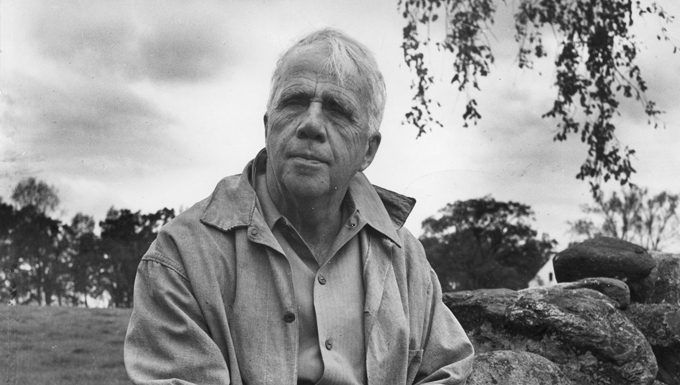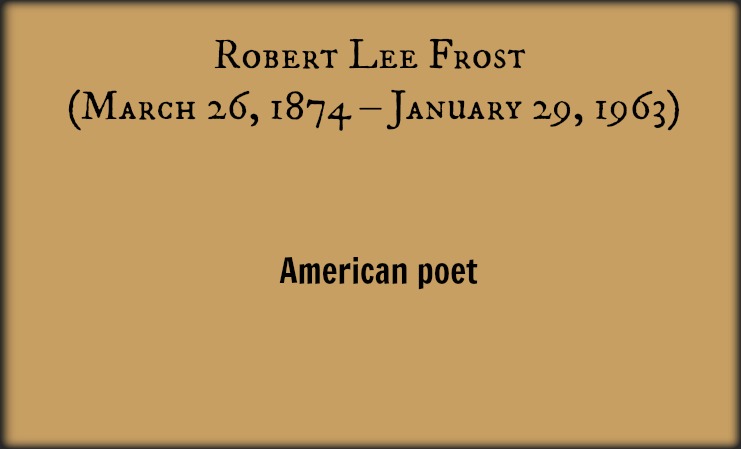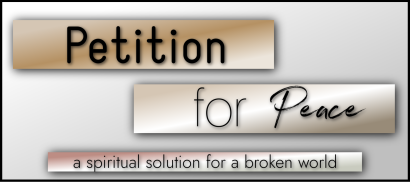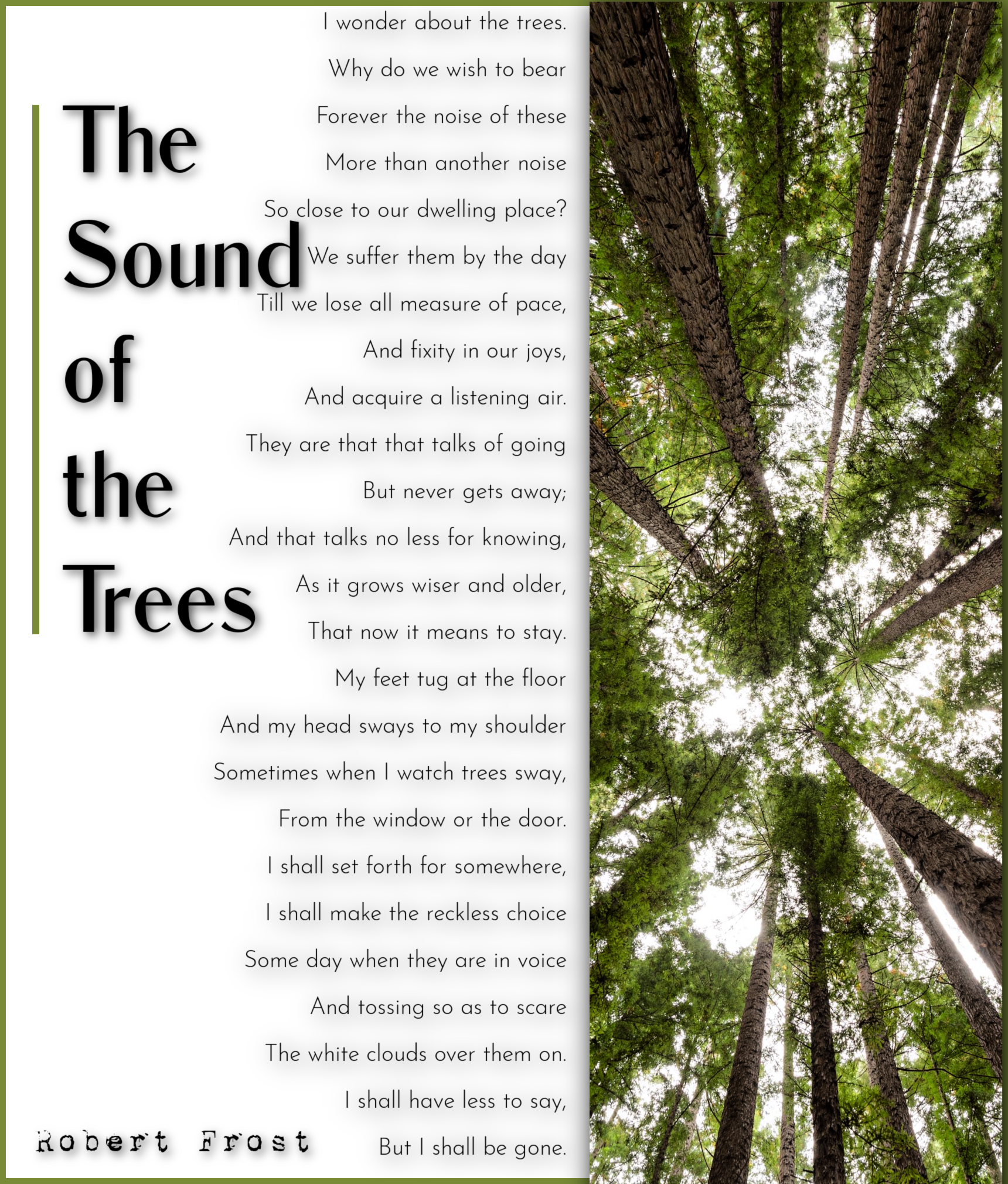
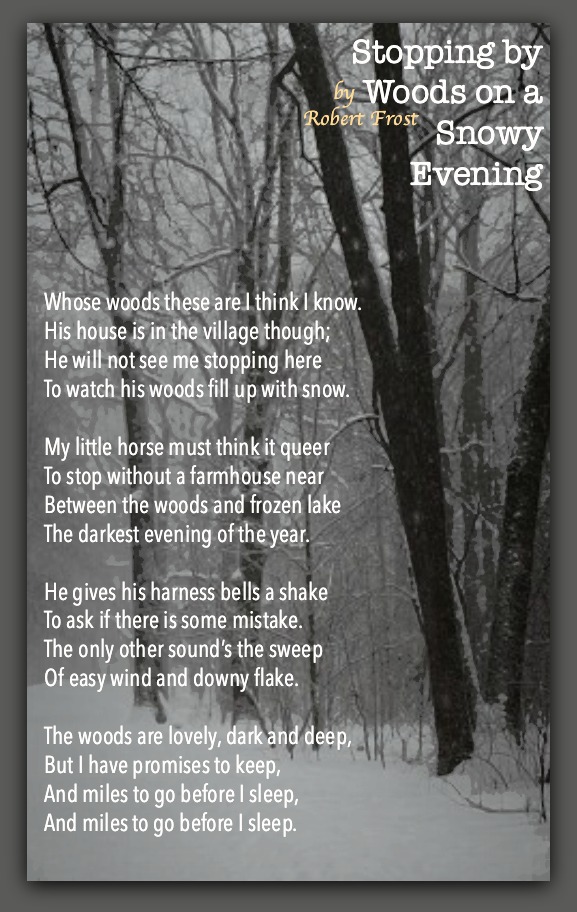
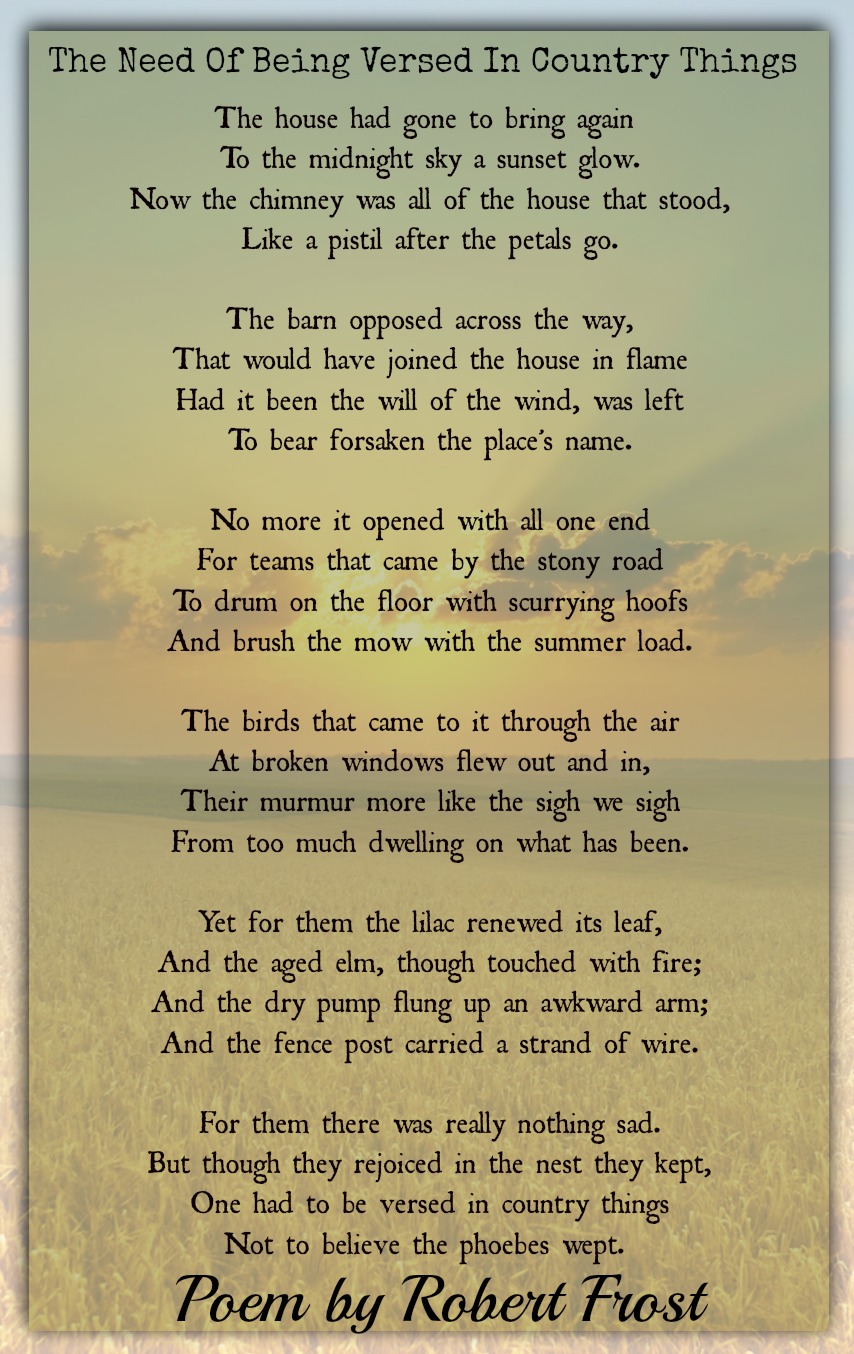
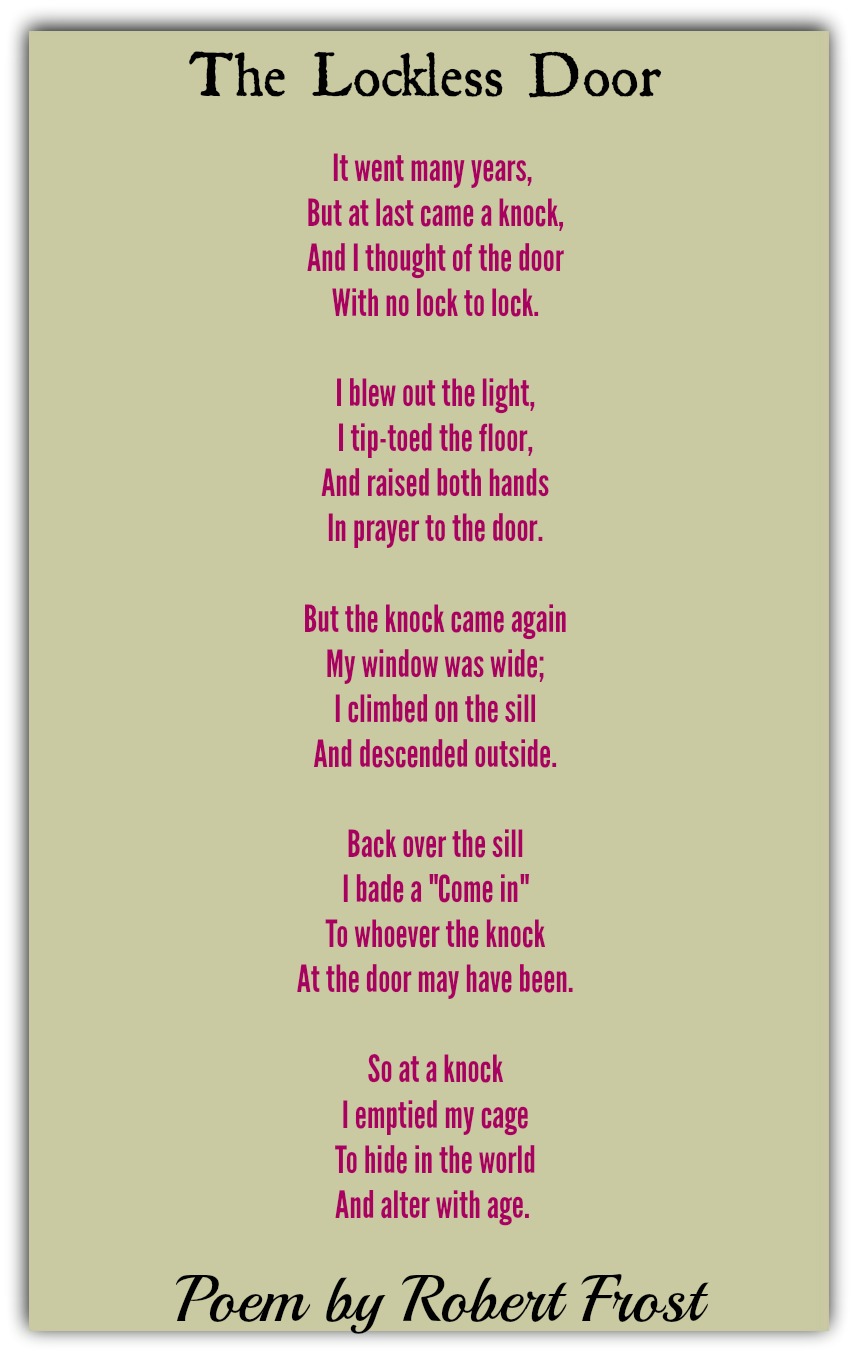
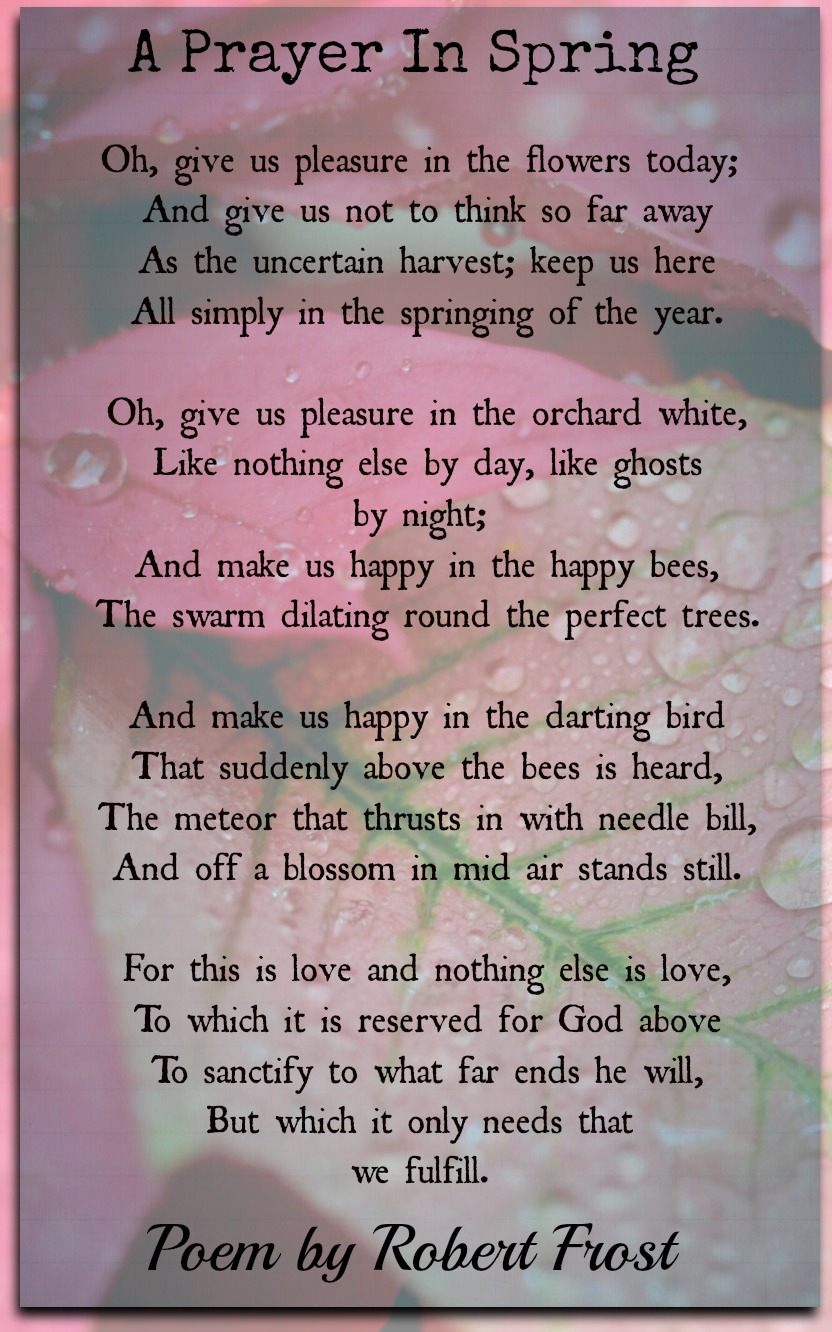
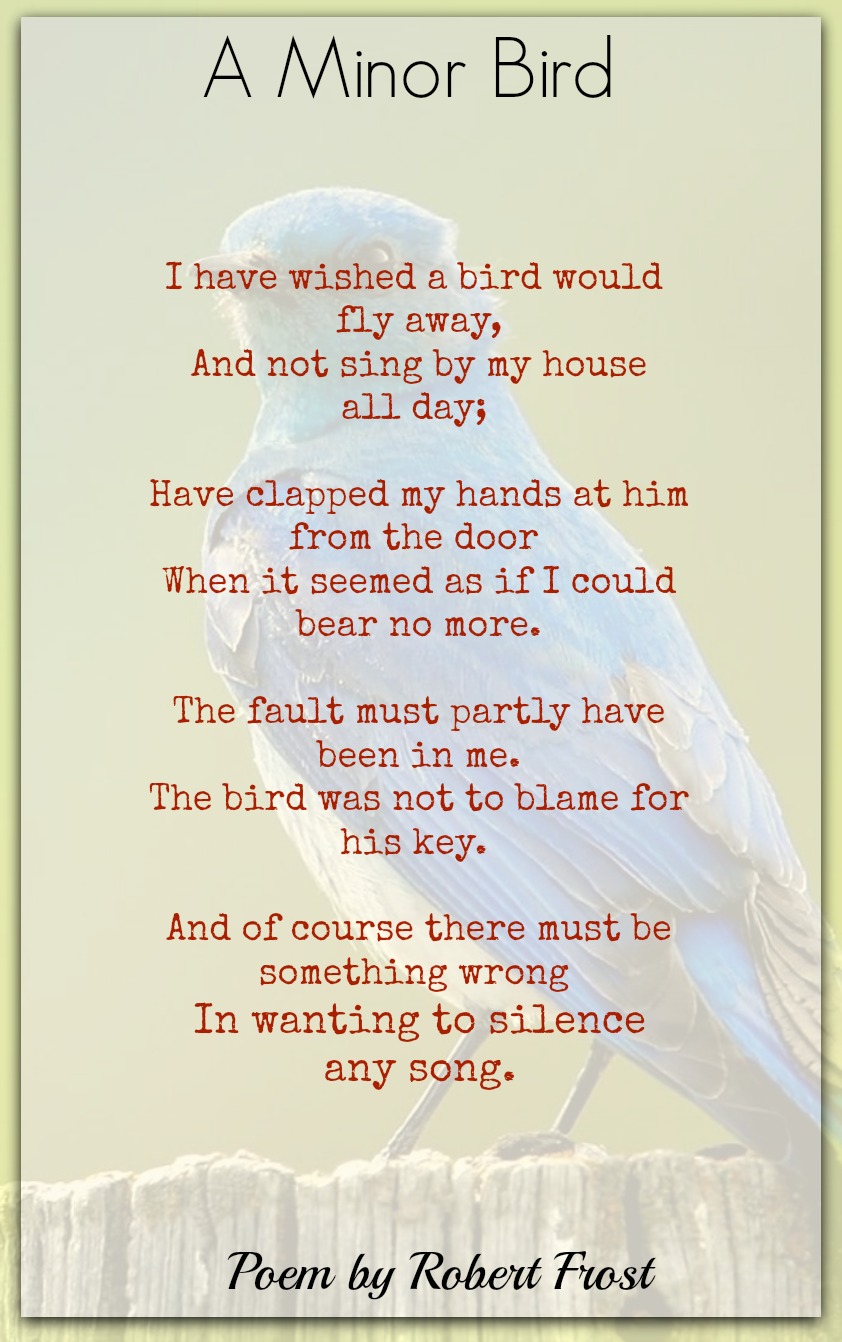
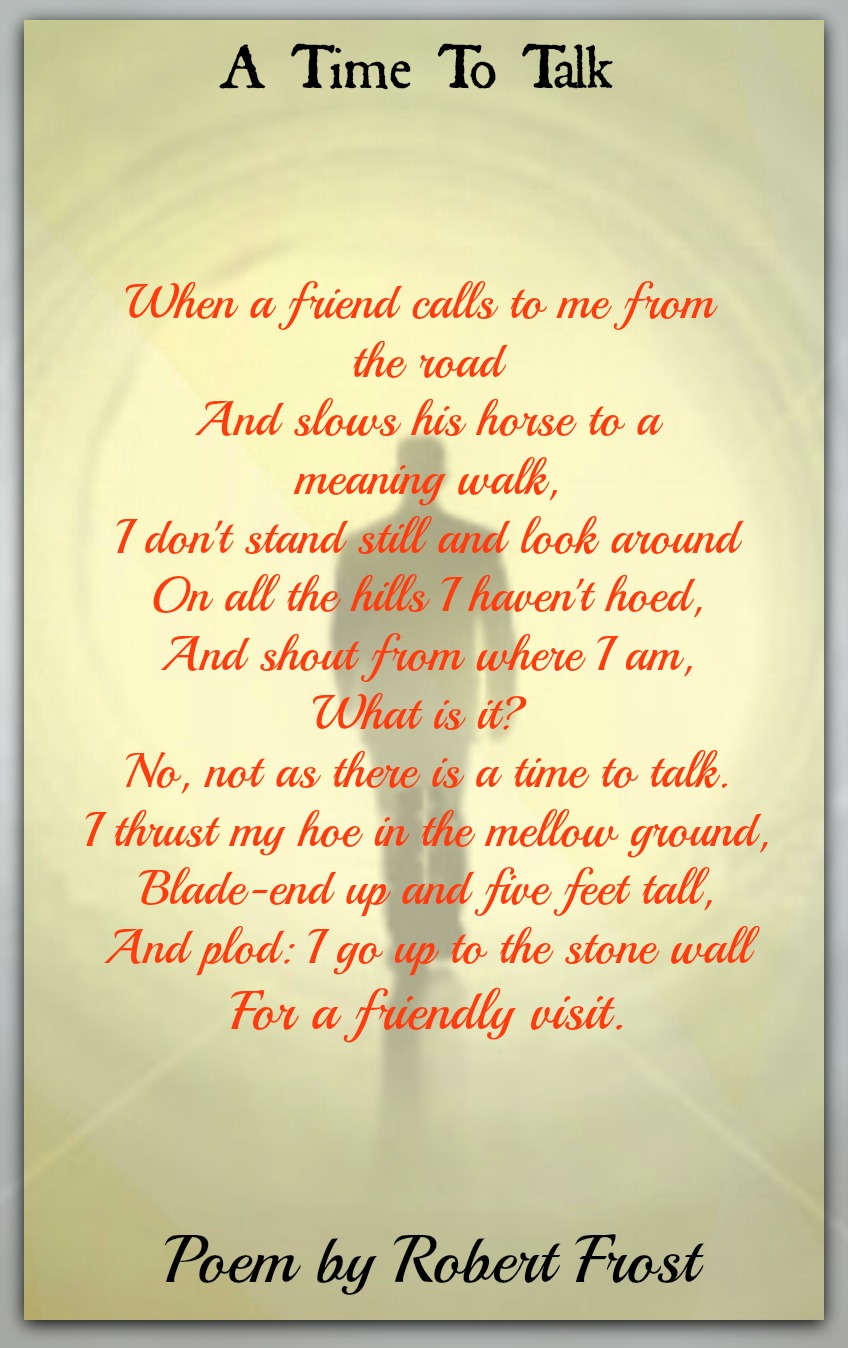
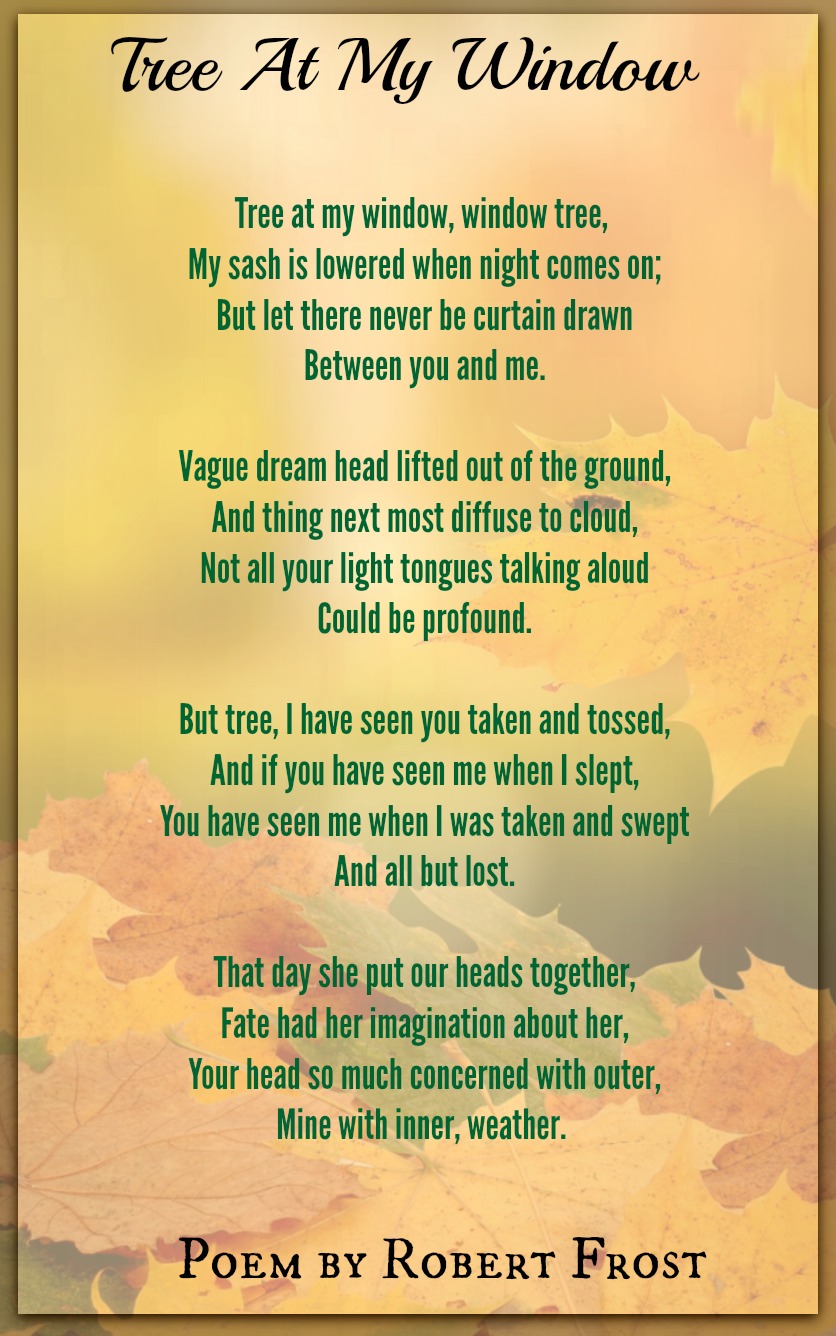
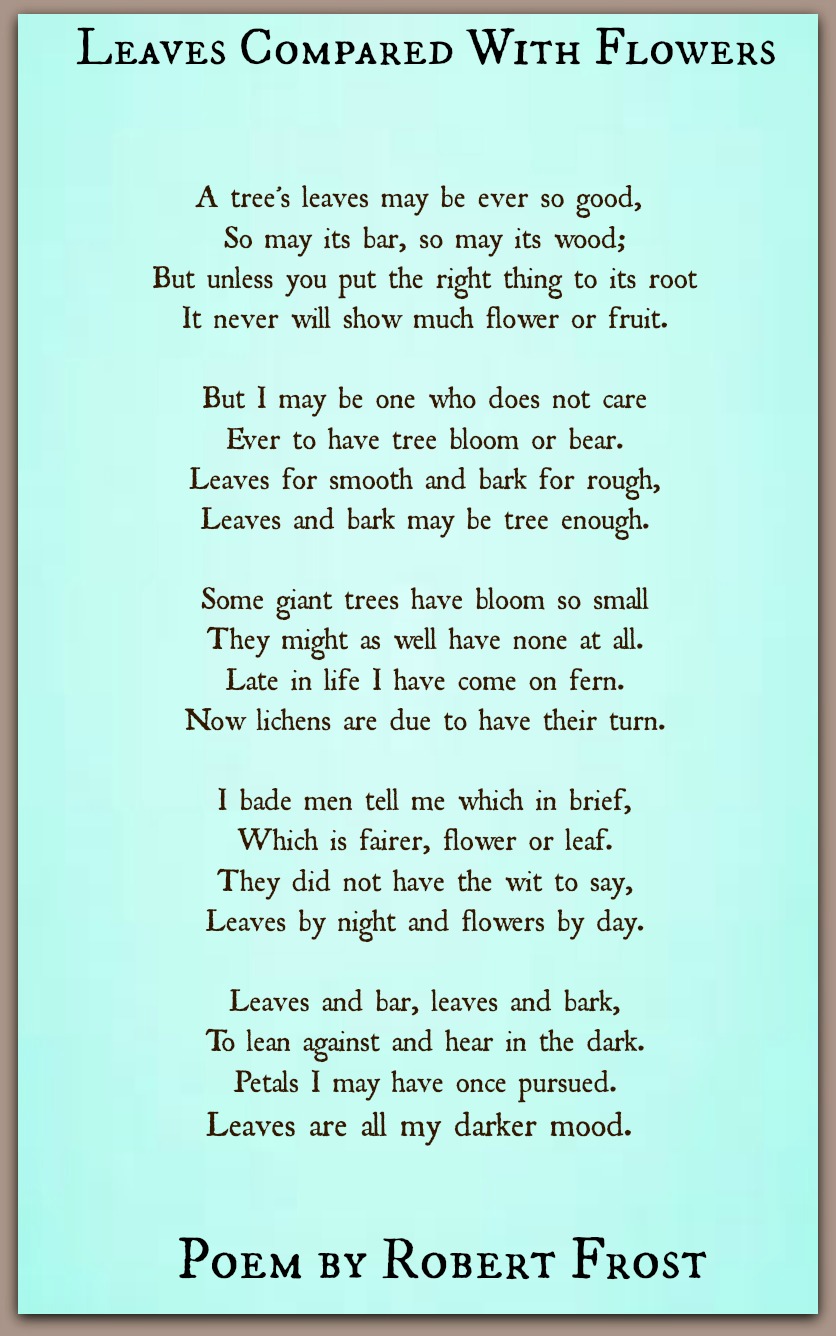
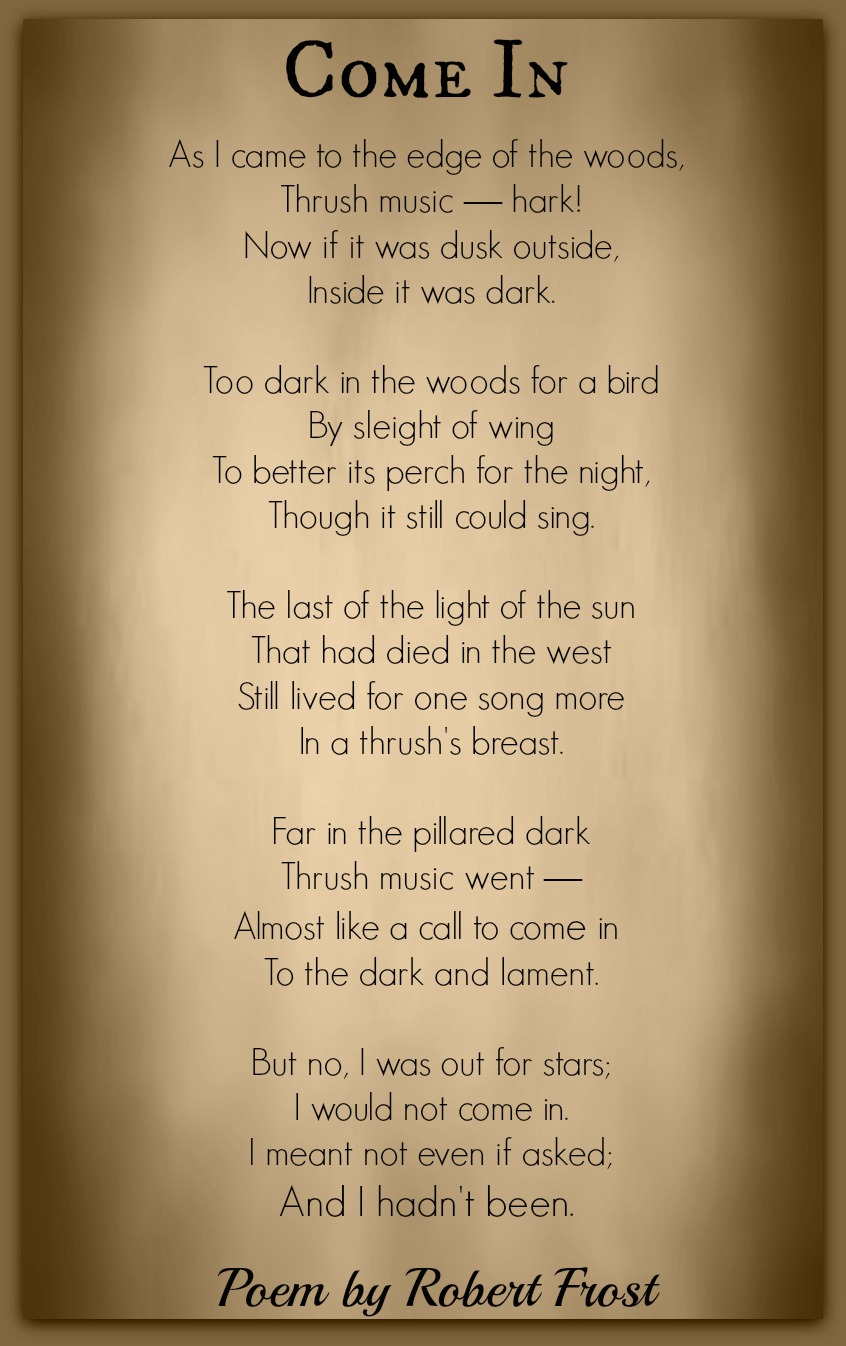
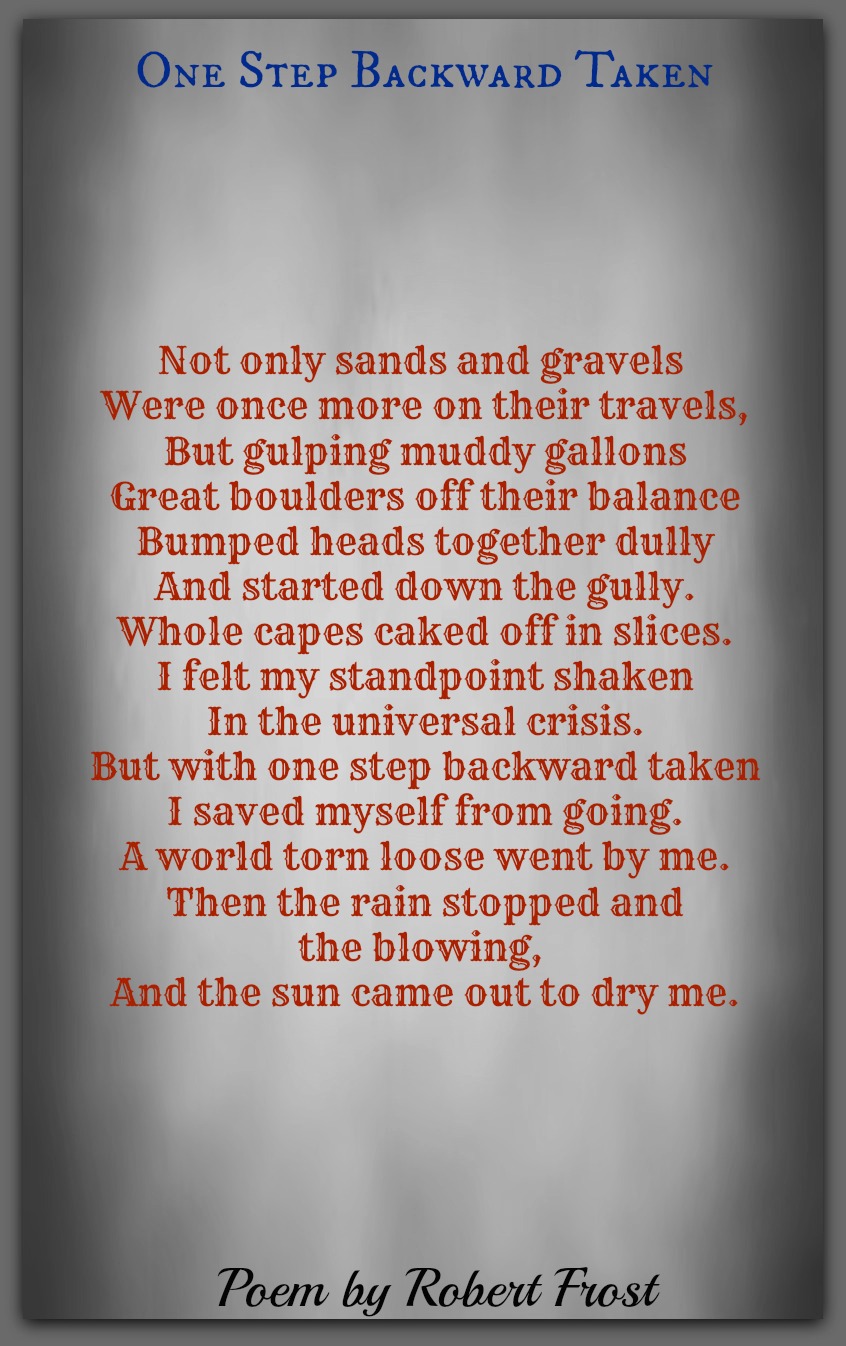
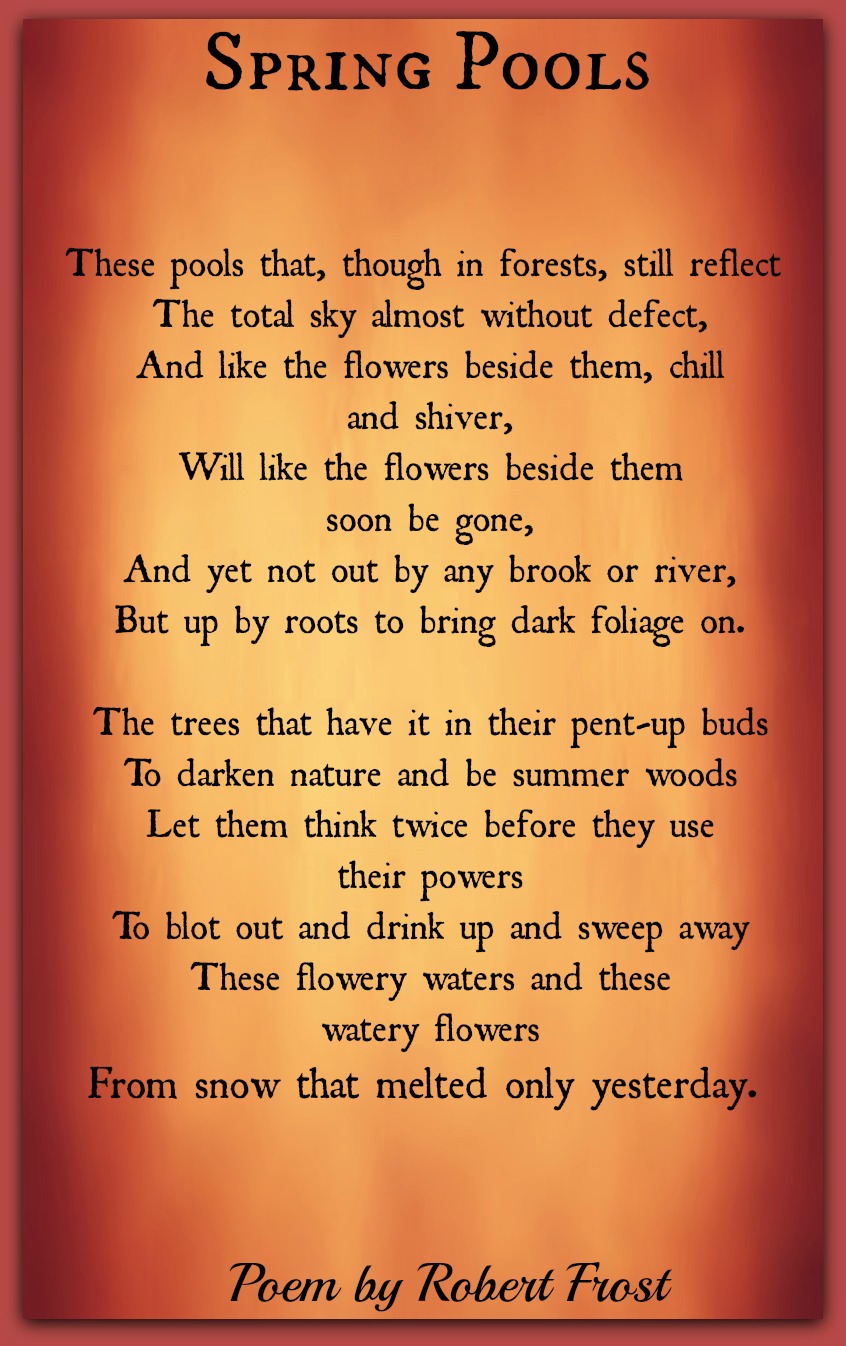
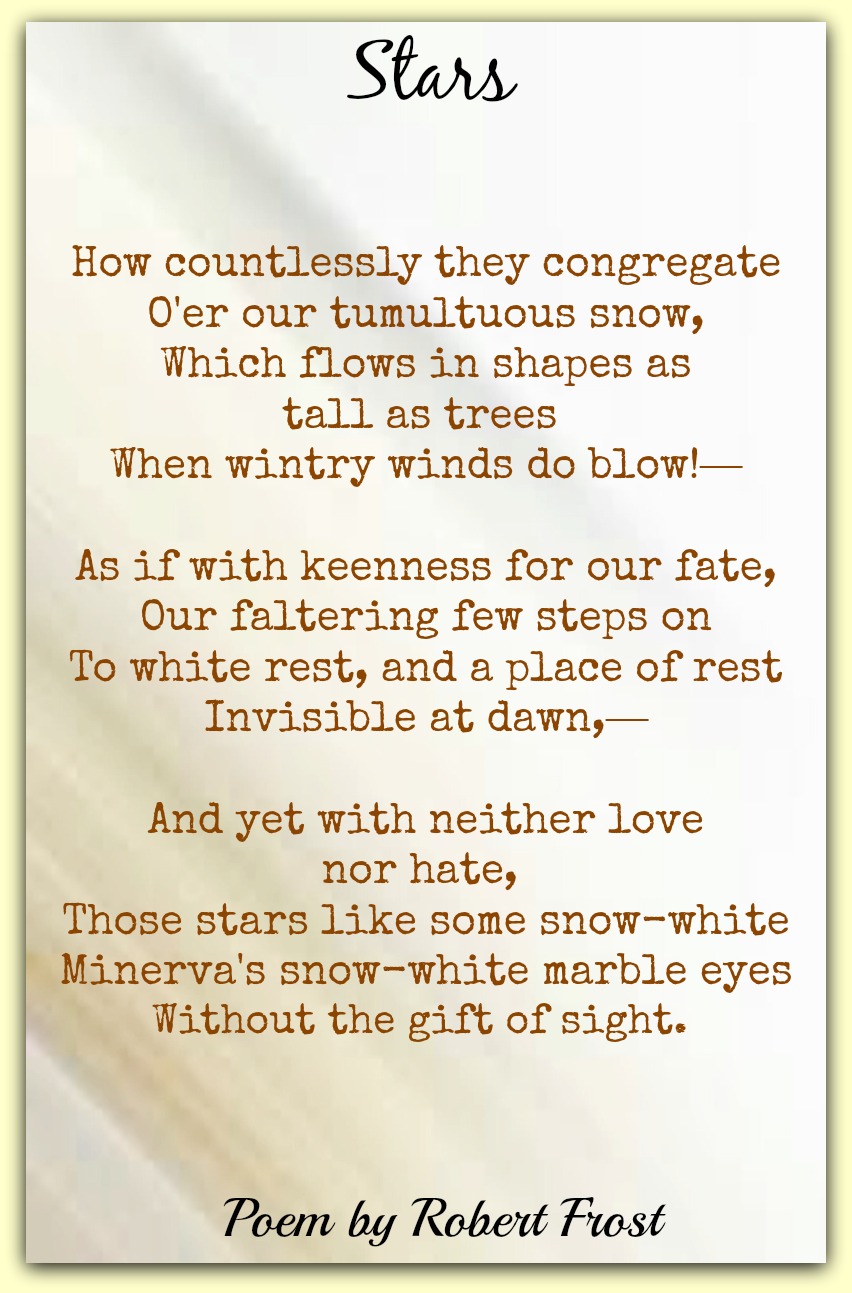
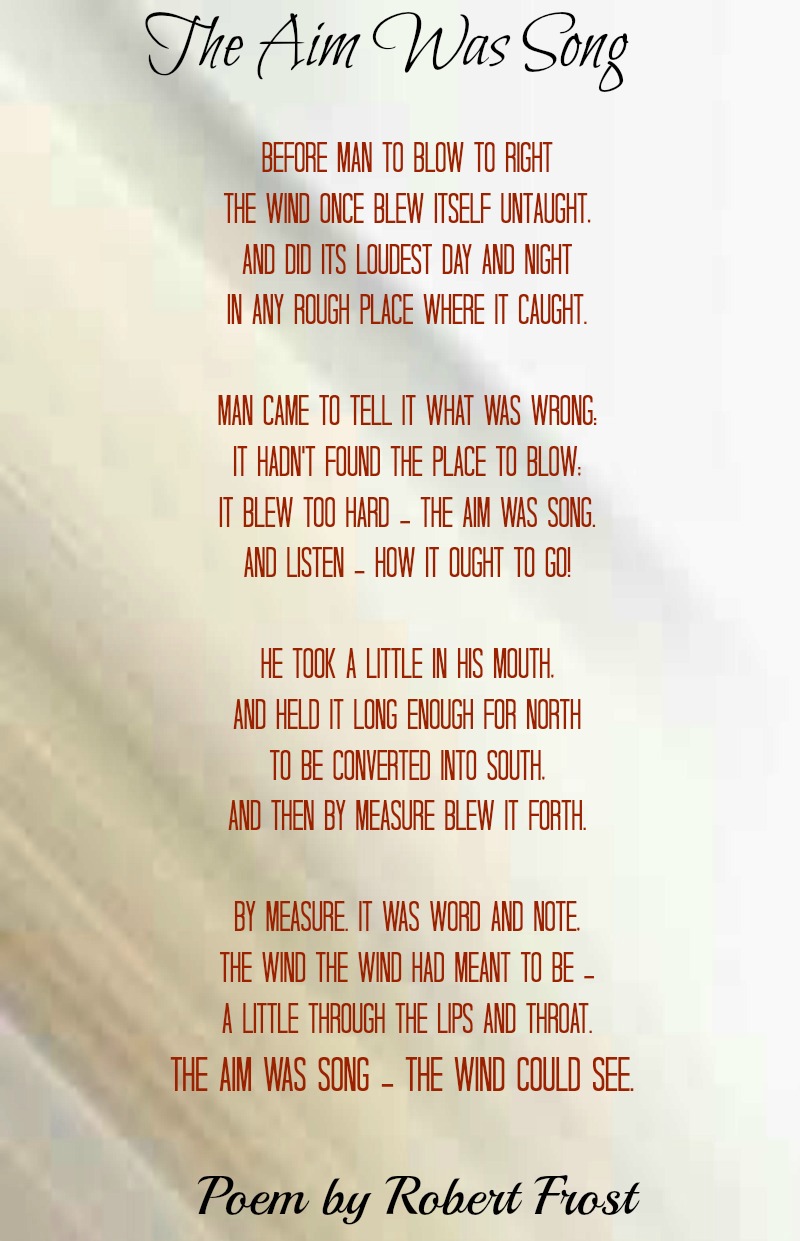
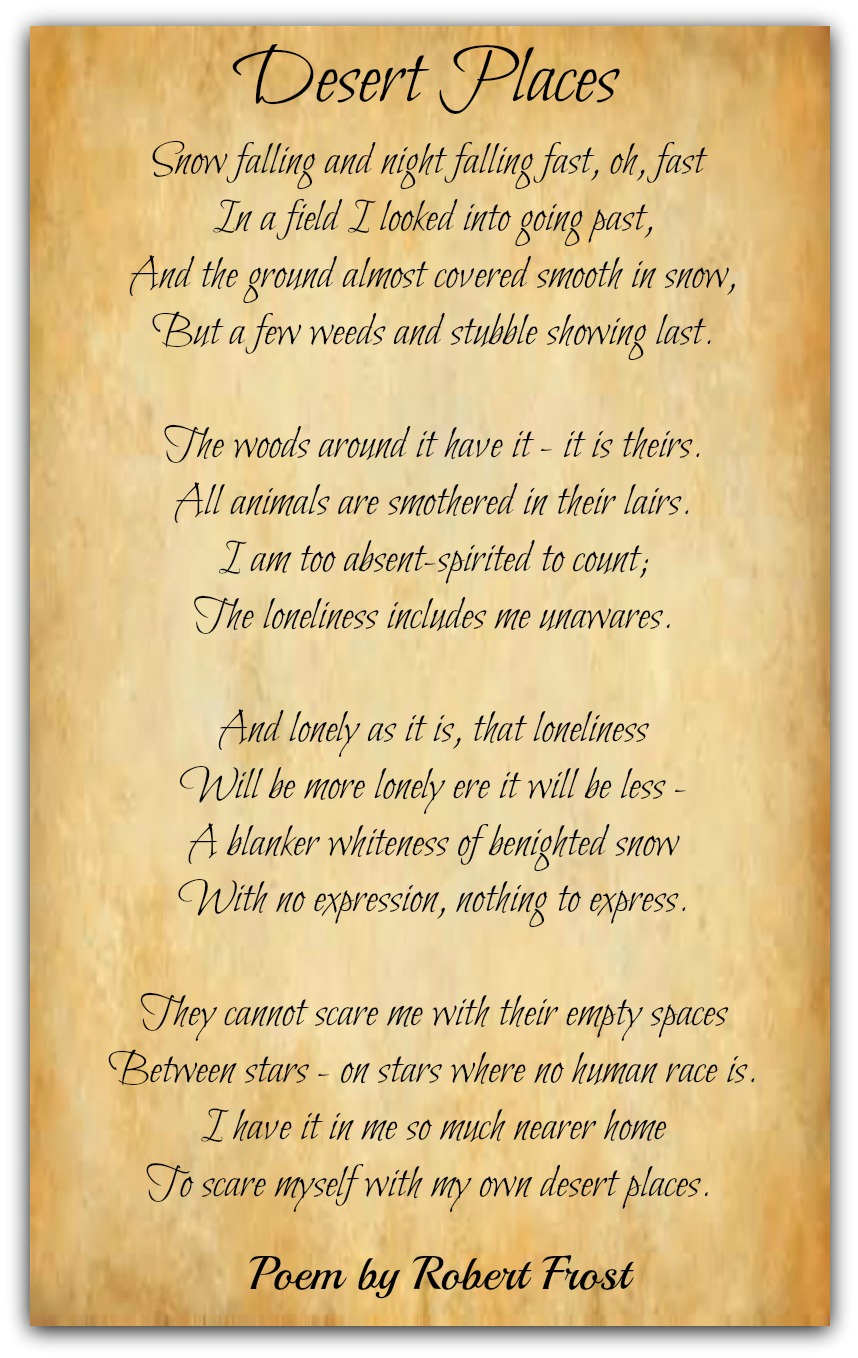
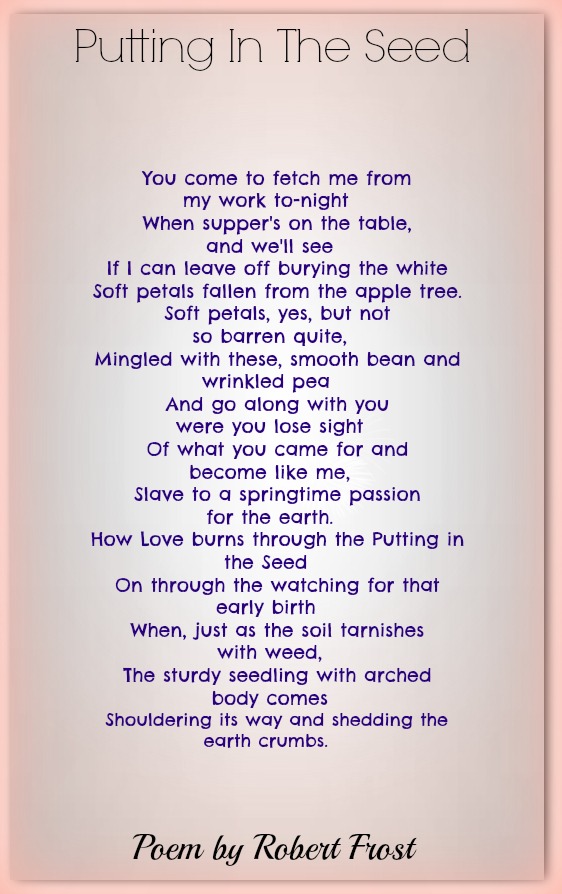
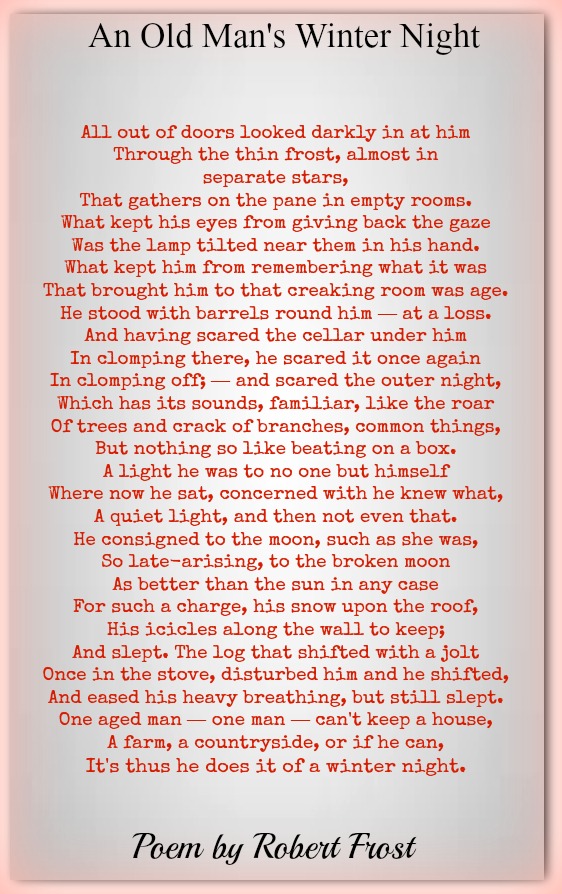
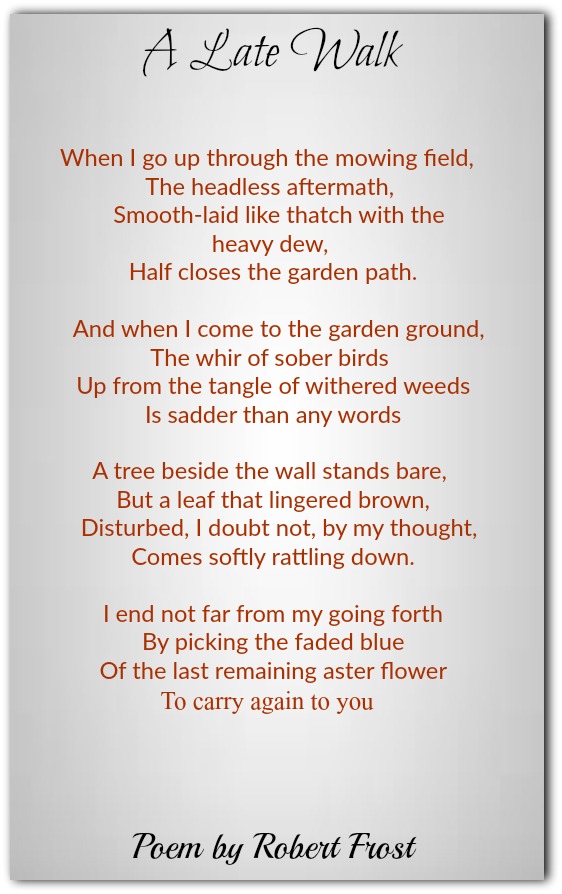
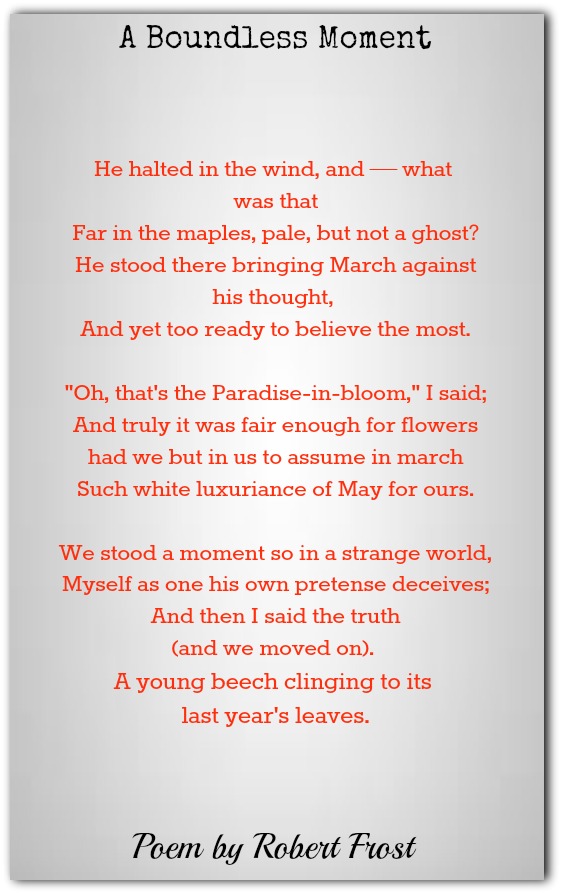
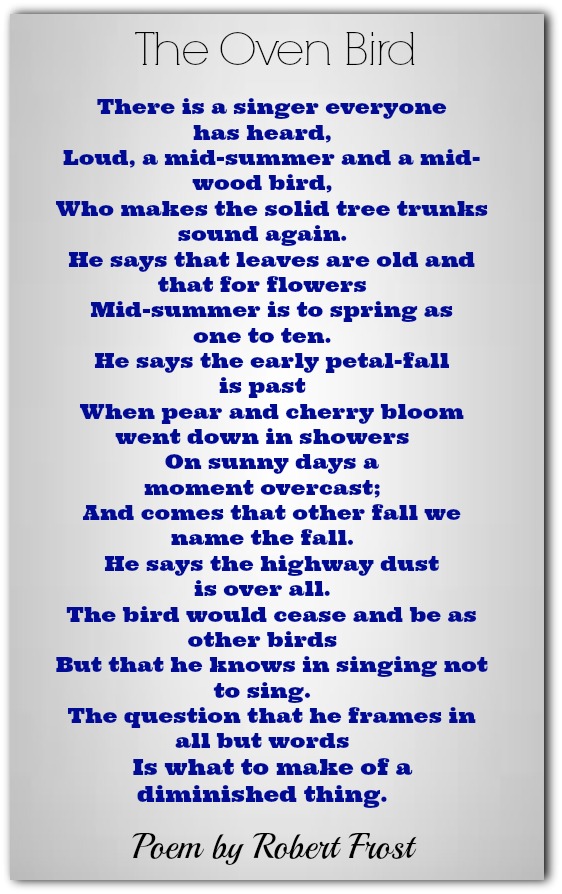
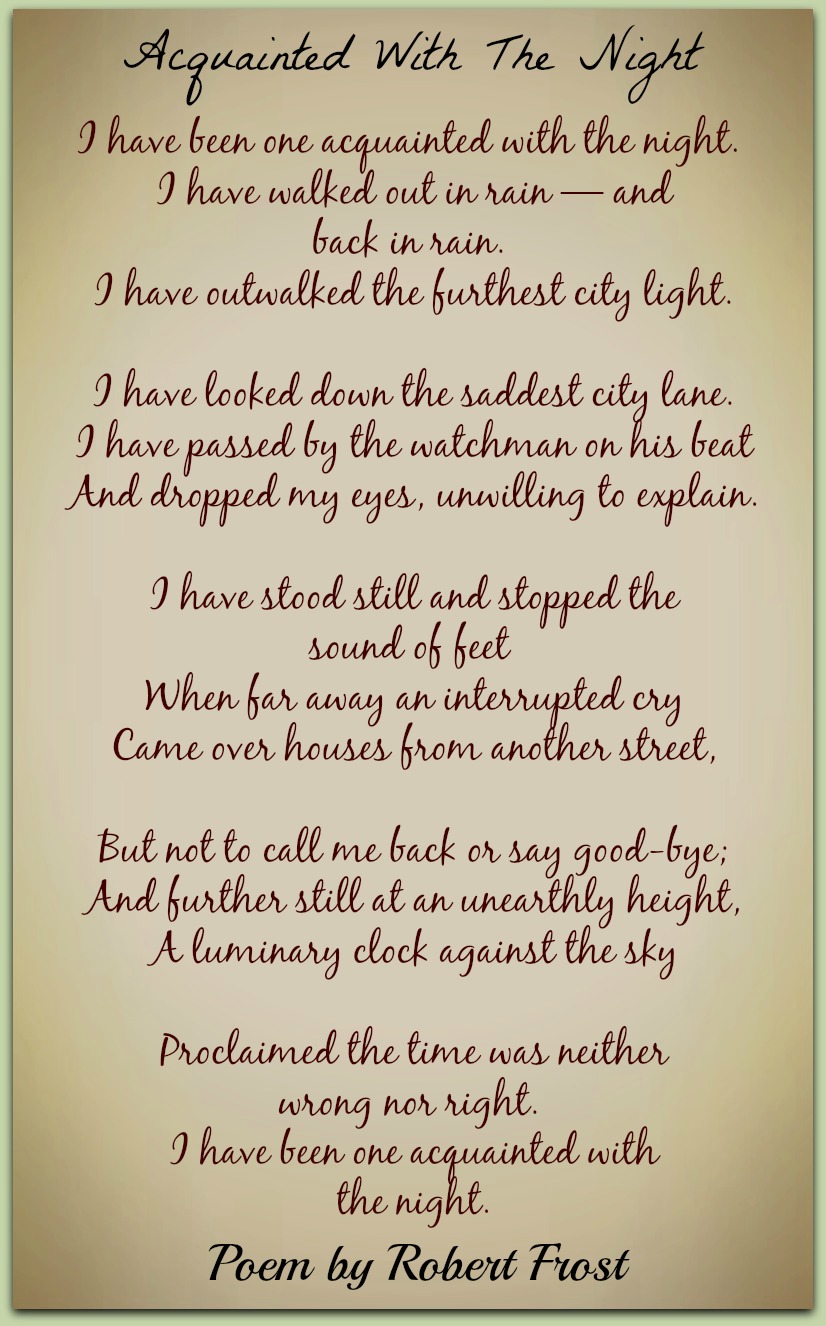
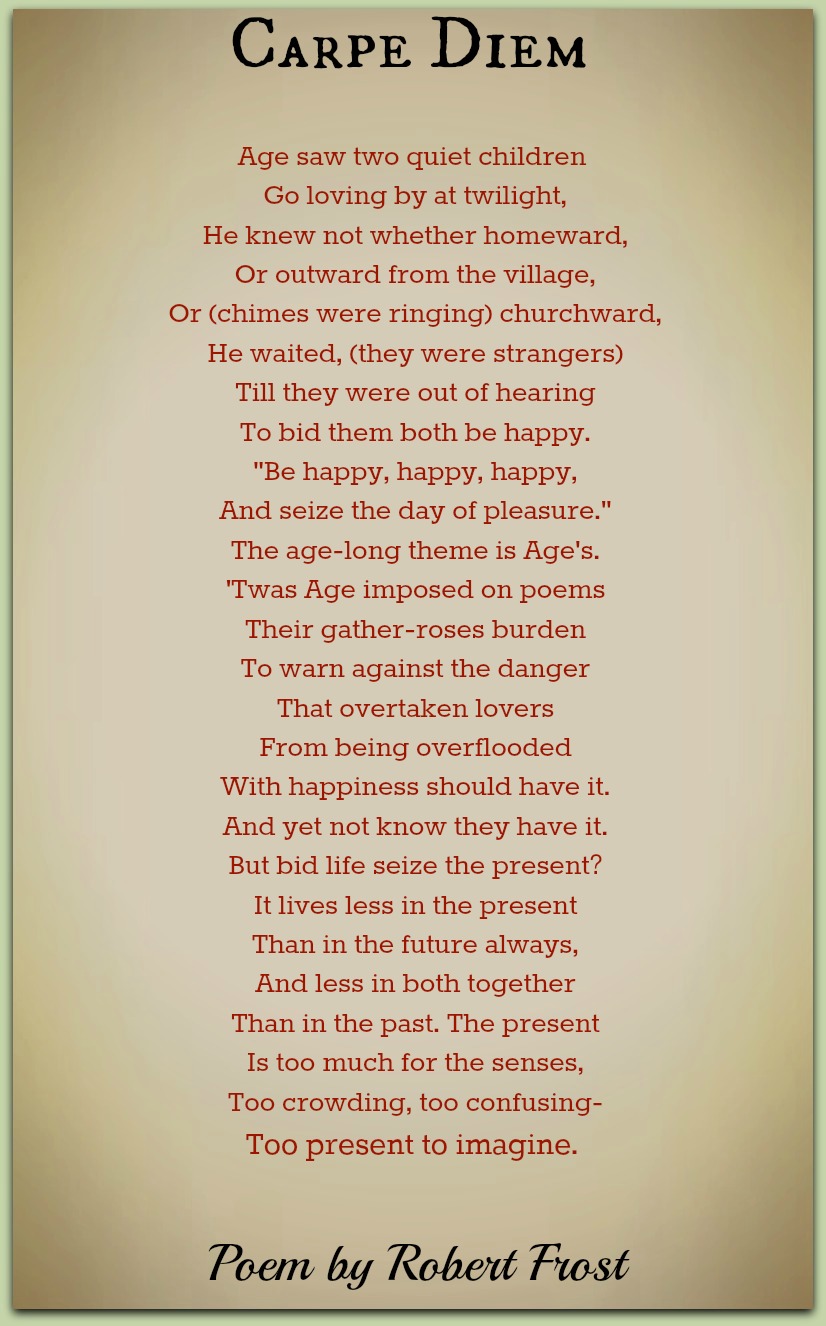
A Patch Of Snow
There's a patch of old snow in a corner
That I should have guessed
Was a blow-away paper the rain
Had brought to rest.
It is speckled with grime as if
Small print overspread it,
The news of a day I've forgotten --
If I ever read it.
|
The Runaway
Once when the snow of the year was beginning to fall,
We stopped by a mountain pasture to say, "Whose colt?"
A little Morgan had one forefoot on the wall,
The other curled at his breast. He dipped his head
And snorted at us. And then he had to bolt,
We heard the miniature thunder where he fled,
And we saw him, or thought we saw him, dim and gray,
Like a shadow against the curtain of falling flakes.
"I think the little fellow's afraid of the snow.
He isn't winter-broken. It isn't play
With the little fellow at all. He's running away.
I doubt if even his mother could tell him, 'Sakes,
It's only weather.' He'd think she didn't know!
Where is his mother? He can't be out alone."
And now he comes again with a clatter of stone
And mounts the wall again with whited eyes
And all his tail that isn't hair up straight.
He shudders his coat as if to throw off flies.
"Whoever it is that leaves him out so late,
When other creatures have gone to stall and bin,
Ought to be told to come and take him in."
|
The Grindstone
Having a wheel and four legs of its own
Has never availed the cumbersome grindstone
To get it anywhere that I can see.
These hands have helped it go and even race;
Not all the motion, though, they ever lent,
Not all the miles it may have thought it went,
Have got it one step from the starting place.
It stands beside the same old apple tree.
The shadow of the apple tree is thin
Upon it now; its feet are fast in snow.
All other farm machinery's gone in,
And some of it on no more legs and wheel
Than the grindstone can boast to stand or go.
(I'm thinking chiefly of the wheelbarrow.)
For months it hasn't known the taste of steel,
Washed down with rusty water in a tin.
But standing outdoors, hungry, in the cold,
Except in towns, at night, is not a sin.
And, anyway, its standing in the yard
Under a ruinous live apple tree
Has nothing any more to do with me,
Except that I remember how of old,
One summer day, all day I drove it hard,
And some one mounted on it rode it hard,
And he and I between us ground a blade.
I gave it the preliminary spin,
And poured on water (tears it might have been);
And when it almost gayly jumped and flowed,
A Father-Time-like man got on and rode,
Armed with a scythe and spectacles that glowed.
He turned on will-power to increase the load
And slow me down--and I abruptly slowed,
Like coming to a sudden railroad station.
I changed from hand to hand in desperation.
I wondered what machine of ages gone
This represented an improvement on.
For all I knew it may have sharpened spears
And arrowheads itself. Much use for years
Had gradually worn it an oblate
Spheroid that kicked and struggled in its gait,
Appearing to return me hate for hate.
(But I forgive it now as easily
As any other boyhood enemy
Whose pride has failed to get him anywhere.)
I wondered who it was the man thought ground--
The one who held the wheel back or the one
Who gave his life to keep it going round?
I wondered if he really thought it fair
For him to have the say when we were done.
Such were the bitter thoughts to which I turned.
Not for myself was I so much concerned.
Oh, no!--although, of course, I could have found
A better way to pass the afternoon
Than grinding discord out of a grindstone,
And beating insects at their gritty tune.
Nor was I for the man so much concerned.
Once when the grindstone almost jumped its bearing
It looked as if he might be badly thrown
And wounded on his blade. So far from caring,
I laughed inside, and only cranked the faster,
(It ran as if it wasn't greased but glued);
I welcomed any moderate disaster
That might be calculated to postpone
What evidently nothing could conclude.
The thing that made me more and more afraid
Was that we'd ground it sharp and hadn't known,
And now were only wasting precious blade.
And when he raised it dripping once and tried
The creepy edge of it with wary touch,
And viewed it over his glasses funny-eyed,
Only disinterestedly to decide
It needed a turn more, I could have cried
Wasn't there danger of a turn too much?
Mightn't we make it worse instead of better?
I was for leaving something to the whetter.
What if it wasn't all it should be? I'd
Be satisfied if he'd be satisfied.
|
My November Guest
My Sorrow, when she's here with me,
Thinks these dark days of autumn rain
Are beautiful as days can be;
She loves the bare, the withered tree;
She walks the sodden pasture lane.
Her pleasure will not let me stay.
She talks and I am fain to list:
She's glad the birds are gone away,
She's glad her simple worsted grey
Is silver now with clinging mist.
The desolate, deserted trees,
The faded earth, the heavy sky,
The beauties she so truly sees,
She thinks I have no eye for these,
And vexes me for reason why.
Not yesterday I learned to know
The love of bare November days
Before the coming of the snow,
But it were vain to tell her so,
And they are better for her praise
|
The Late Walk
When I go up through the mowing field,
The headless aftermath,
Smooth-laid like thatch with the heavy dew,
Half closes the garden path.
And when I come to the garden ground,
The whir of sober birds
Up from the tangle of withered weeds
Is sadder than any words
A tree beside the wall stands bare,
But a leaf that lingered brown,
Disturbed, I doubt not, by my thought,
Comes softly rattling down.
I end not far from my going forth
By picking the faded blue
Of the last remaining aster flower
To carry again to you.
|
A Boundless Moment
He halted in the wind, and — what was that
Far in the maples, pale, but not a ghost?
He stood there bringing March against his thought,
And yet too ready to believe the most.
"Oh, that's the Paradise-in-bloom," I said;
And truly it was fair enough for flowers
had we but in us to assume in march
Such white luxuriance of May for ours.
We stood a moment so in a strange world,
Myself as one his own pretense deceives;
And then I said the truth (and we moved on).
A young beech clinging to its last year's leaves
|
Home Burial
He saw her from the bottom of the stairs
Before she saw him. She was starting down,
Looking back over her shoulder at some fear.
She took a doubtful step and then undid it
To raise herself and look again. He spoke
Advancing toward her: "What is it you see
From up there always? — for I want to know."
She turned and sank upon her skirts at that,
And her face changed from terrified to dull.
He said to gain time: "What is it you see?"
Mounting until she cowered under him.
"I will find out now — you must tell me, dear."
She, in her place, refused him any help,
With the least stiffening of her neck and silence.
She let him look, sure that he wouldn't see,
Blind creature; and a while he didn't see.
But at last he murmured, "Oh" and again, "Oh."
"What is it — what?" she said.
"Just that I see."
"You don't," she challenged. "Tell me what it is."
"The wonder is I didn't see at once.
I never noticed it from here before.
I must be wonted to it — that's the reason.
The little graveyard where my people are!
So small the window frames the whole of it.
Not so much larger than a bedroom, is it?
There are three stones of slate and one of marble,
Broad-shouldered little slabs there in the sunlight
On the sidehill. We haven't to mind those.
But I understand: it is not the stones,
But the child's mound ——"
"Don't, don't, don't,
don't," she cried.
She withdrew, shrinking from beneath his arm
That rested on the banister, and slid downstairs;
And turned on him with such a daunting look,
He said twice over before he knew himself:
"Can't a man speak of his own child he's lost?"
"Not you! — Oh, where's my hat? Oh, I don't need it!
I must get out of here. I must get air.—
I don't know rightly whether any man can."
"Amy! Don't go to someone else this time.
Listen to me. I won't come down the stairs."
He sat and fixed his chin between his fists.
"There's something I should like to ask you, dear."
"You don't know how to ask it."
"Help me, then."
Her fingers moved the latch for all reply.
"My words are nearly always an offense.
I don't know how to speak of anything
So as to please you. But I might be taught,
I should suppose. I can't say I see how.
A man must partly give up being a man
With womenfolk. We could have some arrangement
By which I'd bind myself to keep hands off
Anything special you're a-mind to name.
Though I don't like such things 'twixt those that love.
Two that don't love can't live together without them.
But two that do can't live together with them."
She moved the latch a little. "Don't — don't go.
Don't carry it to someone else this time.
Tell me about it if it's something human.
Let me into your grief. I'm not so much
Unlike other folks as your standing there
Apart would make me out. Give me my chance.
I do think, though, you overdo it a little.
What was it brought you up to think it the thing
To take your mother-loss of a first child
So inconsolably — in the face of love.
You'd think his memory might be satisfied ——"
"There you go sneering now!"
"I'm not, I'm not!
You make me angry. I'll come down to you.
God, what a woman! And it's come to this,
A man can't speak of his own child that's dead."
"You can't because you don't know how to speak.
If you had any feelings, you that dug
With your own hand — how could you? — his little grave;
I saw you from that very window there,
Making the gravel leap and leap in air,
Leap up, like that, like that, and land so lightly
And roll back down the mound beside the hole.
I thought, Who is that man? I didn't know you.
And I crept down the stairs and up the stairs
To look again, and still your spade kept lifting.
Then you came in. I heard your rumbling voice
Out in the kitchen, and I don't know why,
But I went near to see with my own eyes.
You could sit there with the stains on your shoes
Of the fresh earth from your own baby's grave
And talk about your everyday concerns.
You had stood the spade up against the wall
Outside there in the entry, for I saw it."
"I shall laugh the worst laugh I ever laughed.
I'm cursed. God, if I don't believe I'm cursed."
"I can repeat the very words you were saying:
'Three foggy mornings and one rainy day
Will rot the best birch fence a man can build.'
Think of it, talk like that at such a time!
What had how long it takes a birch to rot
To do with what was in the darkened parlour?
You couldn't care! The nearest friends can go
With anyone to death, comes so far short
They might as well not try to go at all.
No, from the time when one is sick to death,
One is alone, and he dies more alone.
Friends make pretense of following to the grave,
But before one is in it, their minds are turned
And making the best of their way back to life
And living people, and things they understand.
But the world's evil. I won't have grief so
If I can change it. Oh, I won't, I won't!"
"There, you have said it all and you feel better.
You won't go now. You're crying. Close the door.
The heart's gone out of it: why keep it up?
Amyl There's someone coming down the road!"
"You — oh, you think the talk is all. I must go —
Somewhere out of this house. How can I make you ——"
"If — you — do!" She was opening the door wider.
"Where do you mean to go? First tell me that.
I'll follow and bring you back by force. I will! —"
|
Devotion
The heart can think of no devotion
Greater than being shore to ocean -
Holding the curve of one position,
Counting an endless repetition.
|
Neither Out Far Nor In Deep
The people along the sand
All turn and look one way.
They turn their back on the land.
They look at the sea all day.
As long as it takes to pass
A ship keeps raising its hull;
The wetter ground like glass
Reflects a standing gull
The land may vary more;
But wherever the truth may be—
The water comes ashore,
And the people look at the sea.
They cannot look out far.
They cannot look in deep.
Btu when was that ever a bar
To any watch they keep?
|
The Silken Tent
She is as in a field of silken tent
At midday when the sunny summer breeze
Has dried the dew and all its ropes relent,
So that in guys it gently sways at ease,
And its supporting central cedar pole,
That is its pinnacle to heavenward
And signifies the sureness of the soul,
Seems to owe naught to any single cord,
But strictly held by none, is loosely bound
By countless silken ties of love and thought
To every thing on earth the compass round,
And only by one's going slightly taut
In the capriciousness of summer air
Is of the slightlest bondage made aware.
|
On Looking Up By Chance At The Constellations
You'll wait a long, long time for anything much
To happen in heaven beyond the floats of cloud
And the Northern Lights that run like tingling nerves.
The sun and moon get crossed, but they never touch,
Nor strike out fire from each other nor crash out loud.
The planets seem to interfere in their curves -
But nothing ever happens, no harm is done.
We may as well go patiently on with our life,
And look elsewhere than to stars and moon and sun
For the shocks and changes we need to keep us sane.
It is true the longest drought will end in rain,
The longest peace in China will end in strife.
Still it wouldn't reward the watcher to stay awake
In hopes of seeing the calm of heaven break
On his particular time and personal sight.
That calm seems certainly safe to last to-night.
|
Spring Pools
These pools that, though in forests, still reflect
The total sky almost without defect,
And like the flowers beside them, chill and shiver,
Will like the flowers beside them soon be gone,
And yet not out by any brook or river,
But up by roots to bring dark foliage on.
The trees that have it in their pent-up buds
To darken nature and be summer woods -
Let them think twice before they use their powers
To blot out and drink up and sweep away
These flowery waters and these watery flowers
From snow that melted only yesterday.
|
Come In
As I came to the edge of the woods,
Thrush music — hark!
Now if it was dusk outside,
Inside it was dark.
Too dark in the woods for a bird
By sleight of wing
To better its perch for the night,
Though it still could sing.
The last of the light of the sun
That had died in the west
Still lived for one song more
In a thrush's breast.
Far in the pillared dark
Thrush music went —
Almost like a call to come in
To the dark and lament.
But no, I was out for stars;
I would not come in.
I meant not even if asked;
And I hadn't been.
|
Revelation
We make ourselves a place apart
Behind light words that tease and flout,
But oh, the agitated heart
Till someone find us really out.
'Tis pity if the case require
(Or so we say) that in the end
We speak the literal to inspire
The understanding of a friend.
But so with all, from babes that play
At hide-and-seek to God afar,
So all who hide too well away
Must speak and tell us where they are.
|
One Step Backward Taken
Not only sands and gravels
Were once more on their travels,
But gulping muddy gallons
Great boulders off their balance
Bumped heads together dully
And started down the gully.
Whole capes caked off in slices.
I felt my standpoint shaken
In the universal crisis.
But with one step backward taken
I saved myself from going.
A world torn loose went by me.
Then the rain stopped and the blowing,
And the sun came out to dry me.
|
To Earthward
Love at the lips was touch
As sweet as I could bear;
And once that seemed too much;
I lived on air
That crossed me from sweet things,
The flow of - was it musk
From hidden grapevine springs
Down hill at dusk?
I had the swirl and ache
From sprays of honeysuckle
That when they're gathered shake
Dew on the knuckle.
I craved strong sweets, but those
Seemed strong when I was young;
The petal of the rose
It was that stung.
Now no joy but lacks salt
That is not dashed with pain
And weariness and fault;
I crave the stain
Of tears, the aftermark
Of almost too much love,
The sweet of bitter bark
And burning clove.
When stiff and sore and scarred
I take away my hand
From leaning on it hard
In grass and sand,
The hurt is not enough:
I long for weight and strength
To feel the earth as rough
To all my length.
|
Asking For Roses
A house that lacks, seemingly, mistress and master,
With doors that none but the wind ever closes,
Its floor all littered with glass and with plaster;
It stands in a garden of old-fashioned roses.
I pass by that way in the gloaming with Mary;
'I wonder,' I say, 'who the owner of those is.'
'Oh, no one you know,' she answers me airy,
'But one we must ask if we want any roses.'
So we must join hands in the dew coming coldly
There in the hush of the wood that reposes,
And turn and go up to the open door boldly,
And knock to the echoes as beggars for roses.
'Pray, are you within there, Mistress Who-were-you?'
'Tis Mary that speaks and our errand discloses.
'Pray, are you within there? Bestir you, bestir you!
'Tis summer again; there's two come for roses.
'A word with you, that of the singer recalling—
Old Herrick: a saying that every maid knows is
A flower unplucked is but left to the falling,
And nothing is gained by not gathering roses.'
We do not loosen our hands' intertwining
(Not caring so very much what she supposes),
There when she comes on us mistily shining
And grants us by silence the boon of her roses.
|
Provide, Provide
The witch that came (the withered hag)
To wash the steps with pail and rag,
Was once the beauty Abishag,
The picture pride of Hollywood.
Too many fall from great and good
For you to doubt the likelihood.
Die early and avoid the fate.
Or if predestined to die late,
Make up your mind to die in state.
Make the whole stock exchange your own!
If need be occupy a throne,
Where nobody can call you crone.
Some have relied on what they knew;
Others on simply being true.
What worked for them might work for you.
No memory of having starred
Atones for later disregard,
Or keeps the end from being hard.
Better to go down dignified
With boughten friendship at your side
Than none at all. Provide, provide!
|
They Were Welcome To Their Belief
Grief may have thought it was grief.
Care may have thought it was care.
They were welcome to their belief,
The overimportant pair.
No, it took all the snows that clung
To the low roof over his bed,
Beginning when he was young,
To induce the one snow on his head.
But whenever the roof camme white
The head in the dark below
Was a shade less the color of night,
A shade more the color of snow.
Grief may have thought it was grief.
Care may have thought it was care.
But neither one was the thief
Of his raven color of hair.
|
The Need Of Being Versed In Country Things
The house had gone to bring again
To the midnight sky a sunset glow.
Now the chimney was all of the house that stood,
Like a pistil after the petals go.
The barn opposed across the way,
That would have joined the house in flame
Had it been the will of the wind, was left
To bear forsaken the place's name.
No more it opened with all one end
For teams that came by the stony road
To drum on the floor with scurrying hoofs
And brush the mow with the summer load.
The birds that came to it through the air
At broken windows flew out and in,
Their murmur more like the sigh we sigh
From too much dwelling on what has been.
Yet for them the lilac renewed its leaf,
And the aged elm, though touched with fire;
And the dry pump flung up an awkward arm;
And the fence post carried a strand of wire.
For them there was really nothing sad.
But though they rejoiced in the nest they kept,
One had to be versed in country things
Not to believe the phoebes wept.
|
|
